Airtable has carved out a niche for itself by offering a flexible, spreadsheet-meets-database platform that’s loved by project managers, content teams, product marketers, and operations folks alike. But as businesses scale or demand deeper customization, automation, or native integrations, Airtable might start showing its limitations—especially in pricing, API flexibility, or user permission controls. If you’re seeking tools that deliver similar or more advanced capabilities like relational databases, workflow automation, project tracking, or real-time collaboration, then this list is for you.
Below, we evaluate the top Airtable alternatives in 2025 based on key SaaSworthy criteria to help you make an informed switch.
How We Selected These Airtable Alternatives
At SaaSworthy, we evaluate tools based on these key dimensions:
1. Functionality Fit
We look for tools that offer similar or enhanced features compared to Airtable: relational data structures, spreadsheet views, custom fields, automation, integrations, and user collaboration.
2. Ease of Use & Adoption Curve
No matter how powerful a tool is, if it’s difficult to implement or onboard, teams won’t use it. We focus on platforms with intuitive interfaces, guided templates, and helpful onboarding.
3. Scalability & Flexibility
From startups to enterprises, we select tools that grow with your team—whether it’s via API access, modular add-ons, or advanced user permissions.
4. Pricing Transparency & Value
Tools that deliver strong ROI without hidden costs (such as limited views, record caps, or automation ceilings) rank higher in our list.
5. User Sentiment
We also scan platforms like Reddit, G2, and Trustpilot to gauge how users feel—both early adopters and seasoned users—about performance, support, and roadmap direction.
Top 10 Airtable Alternatives in 2025
Notion
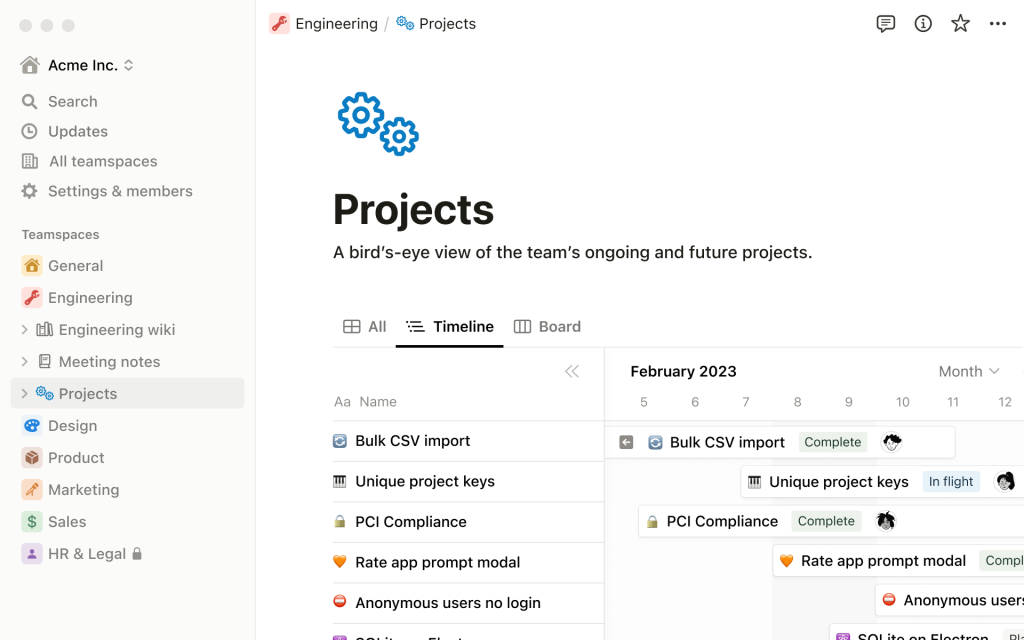
Best for: Teams that want a unified workspace for docs, databases, and project tracking
Standout Feature: Linked databases and AI-powered documentation
Notion has evolved far beyond a simple note-taking app. With its database capabilities, you can create CRM boards, content calendars, task pipelines, and more—all with rich document embedding and seamless internal linking.
Why it’s a strong Airtable alternative:
Notion provides flexibility similar to Airtable but adds powerful document support, inline editing, and better cross-page referencing. It also integrates with automation platforms like Zapier and Make, plus built-in AI assistance.
Pricing: Free for individuals, paid plans start at $8/user/month
ClickUp
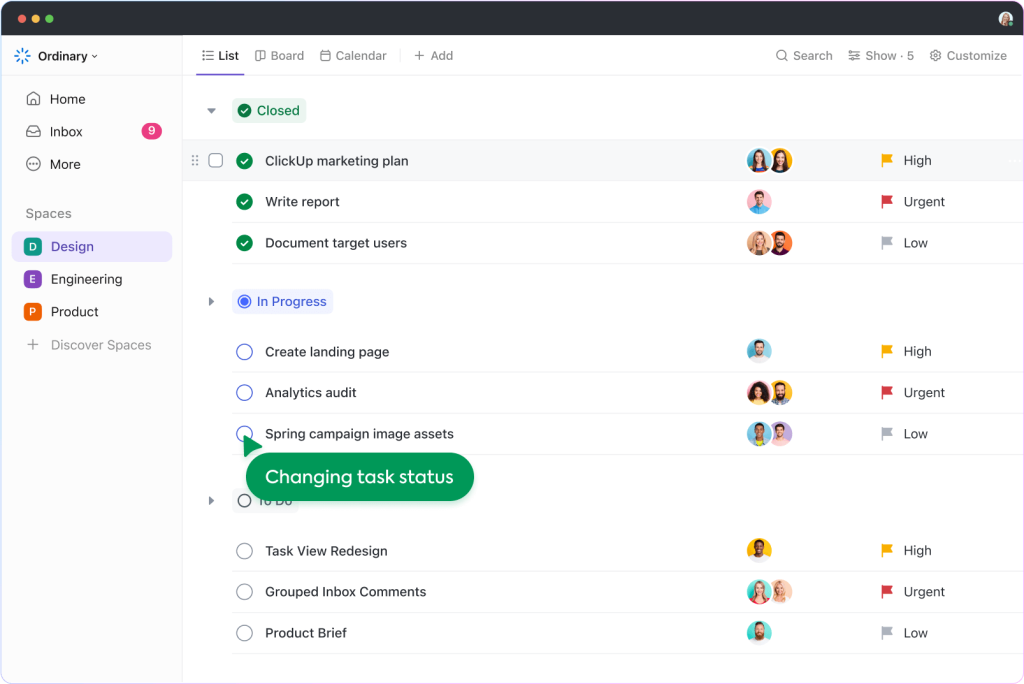
Best for: Project teams managing complex workflows
Standout Feature: Custom views (List, Gantt, Kanban, Calendar) and powerful automation
ClickUp is a project management powerhouse that combines docs, goals, dashboards, and databases under one roof. Its list-based architecture can be tailored to resemble Airtable’s tables, and it offers far greater native task management.
Why it’s a strong Airtable alternative:
While Airtable is more database-centric, ClickUp excels at task tracking and hierarchical organization (Spaces > Folders > Lists). Plus, ClickUp 3.0 brings modularity and real-time collaboration with upgraded speed and AI features.
Pricing: Free plan available; Paid plans start at $7/user/month
Coda
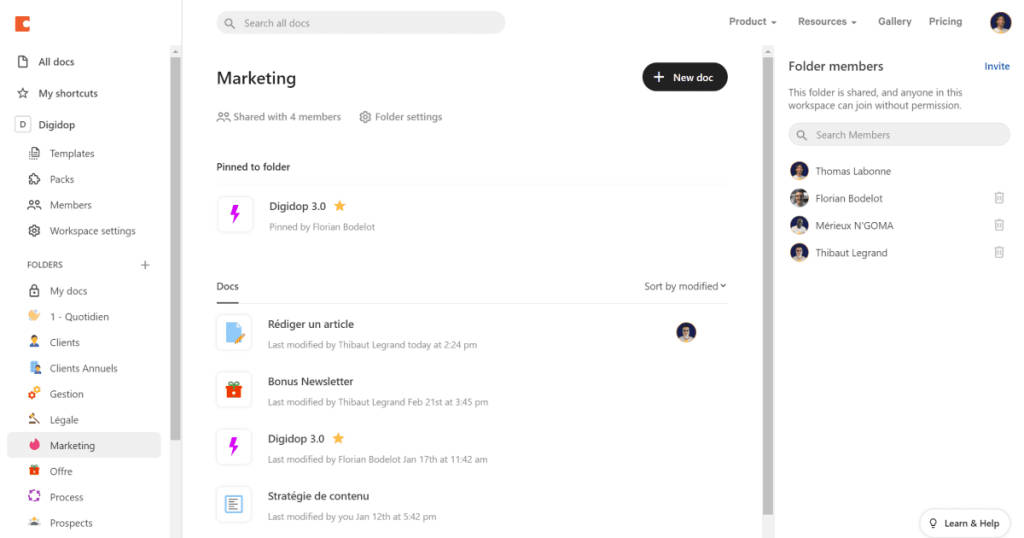
Best for: Product and operations teams building internal tools
Standout Feature: Packs (integrations), buttons, and automation
Coda blends documents, spreadsheets, and apps into one canvas. Like Airtable, it offers database tables, but goes further with formulas, conditionals, and integrations known as “Packs.” It’s a favorite for building internal CRMs, content trackers, and OKR dashboards.
Why it’s a strong Airtable alternative:
Coda offers a more doc-first interface with rich logic handling. If you’ve outgrown Airtable’s formula limitations or need tighter workflow automation, Coda’s scripting and interactive controls are a major plus.
Pricing: Free plan; Paid plans start at $10/user/month
Asana
Best for: Task-centric teams who want structure and reporting
Standout Feature: Advanced workflows and goal tracking
Asana isn’t a database-first tool like Airtable, but for teams primarily focused on project execution and progress tracking, it’s a great switch. It offers robust reporting, timelines, and custom fields to mimic database views.
Why it’s a strong Airtable alternative:
Asana has matured into a comprehensive work management suite. For users who used Airtable to run project trackers or content calendars, Asana offers a more guided, structured environment with fewer dependencies on custom views.
Pricing: Free for basic use; Paid plans start at $10.99/user/month
Smartsheet
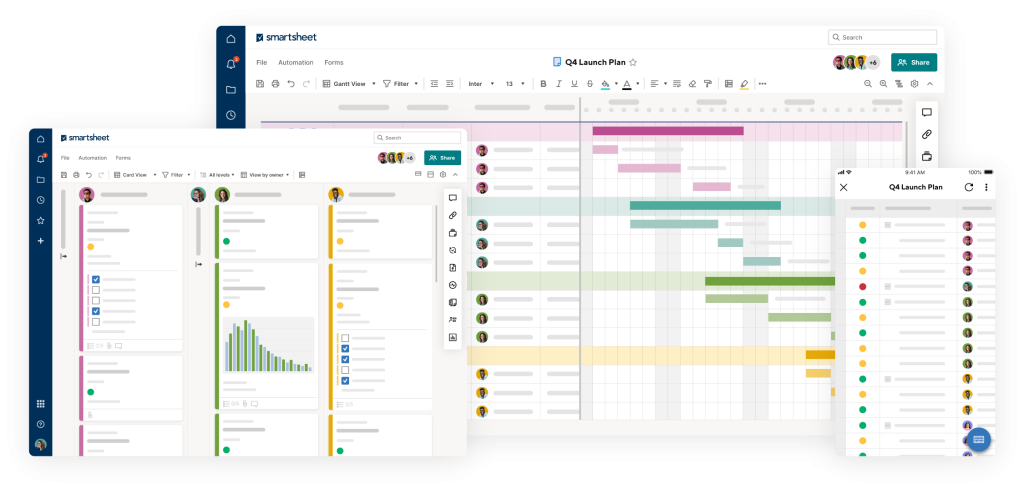
Best for: Enterprise teams used to Excel but wanting more collaboration
Standout Feature: Spreadsheet-like interface with Gantt charts and resource tracking
Smartsheet is an enterprise-grade work execution platform that retains a familiar spreadsheet look and feel but adds powerful project planning, resource management, and automation.
Why it’s a strong Airtable alternative:
Smartsheet is better suited for complex, matrixed teams. While Airtable is great for flexible databases, Smartsheet is ideal for those who need traditional project management tools in a familiar format.
Pricing: Starts at $7/user/month (Pro), with advanced plans for enterprise use
monday.com
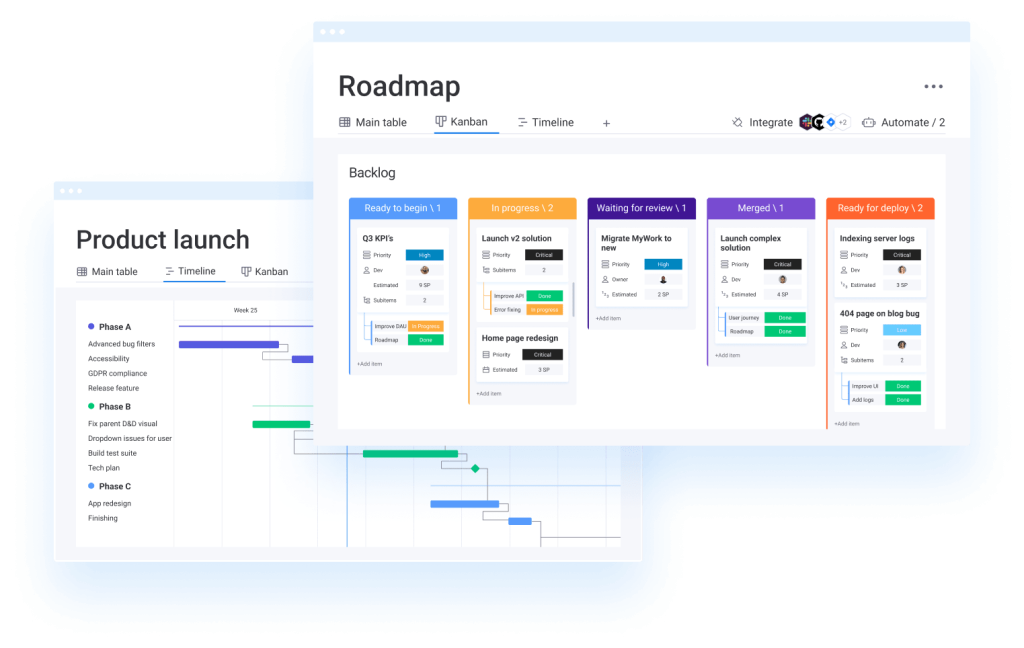
Best for: Marketing and sales teams tracking deliverables
Standout Feature: Highly visual boards and robust integrations
Monday.com is known for its vibrant, user-friendly interface and modular boards. It functions similarly to Airtable’s views but is easier to adopt for non-technical users.
Why it’s a strong Airtable alternative:
If Airtable feels too “techy,” Monday’s visual nature can make data management and collaboration easier. Its automation recipes and integrations with tools like Slack, Google Drive, and Salesforce make it enterprise-ready.
Pricing: Free for up to 2 users; Paid plans start at $9/user/month
Stackby
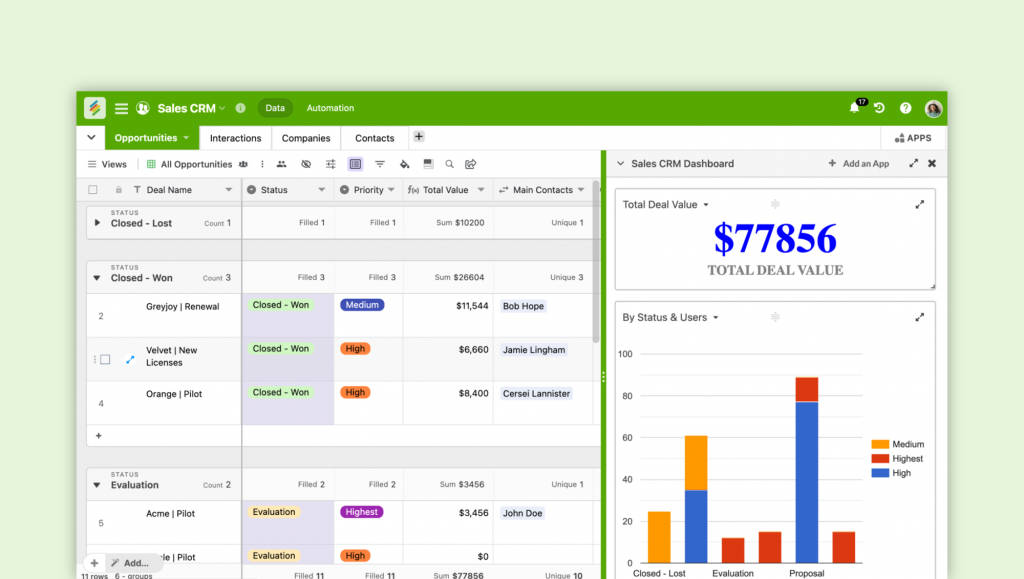
Best for: Small teams looking for Airtable-style databases with API support
Standout Feature: API column types and real-time data pulls
Stackby is a homegrown Airtable alternative that blends spreadsheet simplicity with database features and built-in API integrations (YouTube, Google Analytics, Clearbit, etc.).
Why it’s a strong Airtable alternative:
For users who want to pull live data into columns or manipulate APIs without scripting, Stackby shines. It’s affordable and ideal for startup and content teams needing live reporting dashboards.
Pricing: Free tier available; Paid plans start at $5/user/month
Baserow
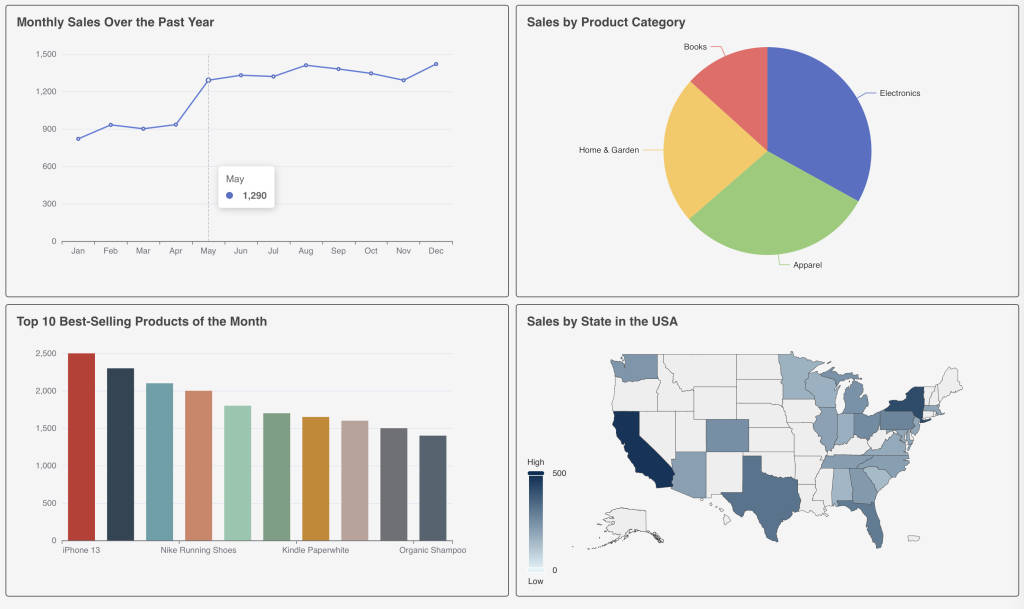
Best for: Developers looking for an open-source Airtable alternative
Standout Feature: Self-hosting and custom plugin architecture
Baserow is an open-source no-code database tool that closely resembles Airtable in layout and UX. It’s designed for teams that want control over their infrastructure and customization freedom.
Why it’s a strong Airtable alternative:
If you’re looking to host your own Airtable-like solution and build custom features, Baserow is a solid pick. It also supports REST APIs and role-based permissions.
Pricing: Free to self-host; Cloud version starts at €5/user/month
Zenkit
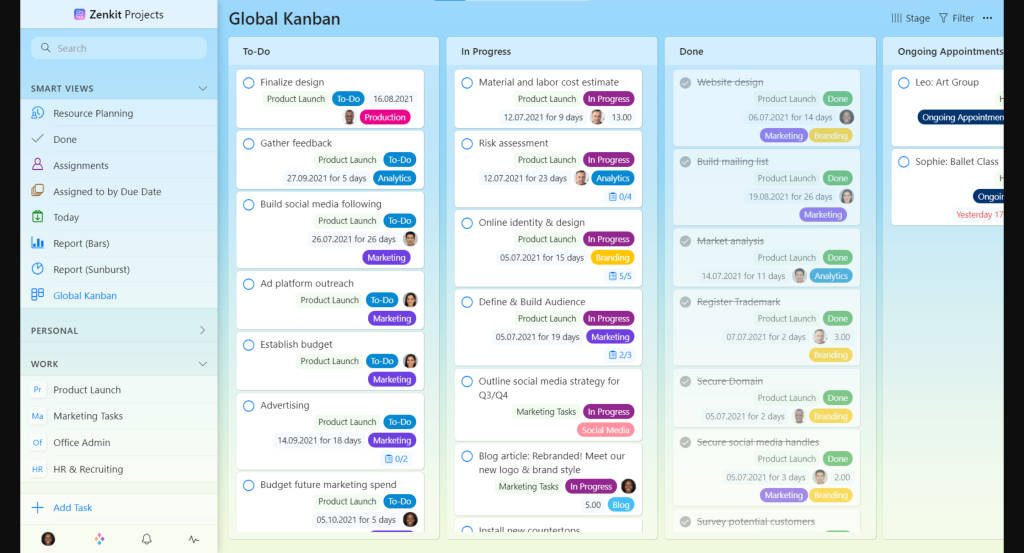
Best for: Teams juggling tasks, mind maps, and wikis in one place
Standout Feature: Multiple interchangeable views—List, Table, Calendar, Kanban, Mind Map
Zenkit combines the flexibility of Airtable with task management and documentation tools. Its “Zenkit Suite” allows seamless switching between different tools (Projects, Base, Hypernotes).
Why it’s a strong Airtable alternative:
Where Airtable is view-limited unless configured, Zenkit lets you natively toggle between views. It’s ideal for teams that prefer mapping data in multiple formats—especially researchers and marketers.
Pricing: Free for up to 3 users; Paid plans start at $9/user/month
SeaTable
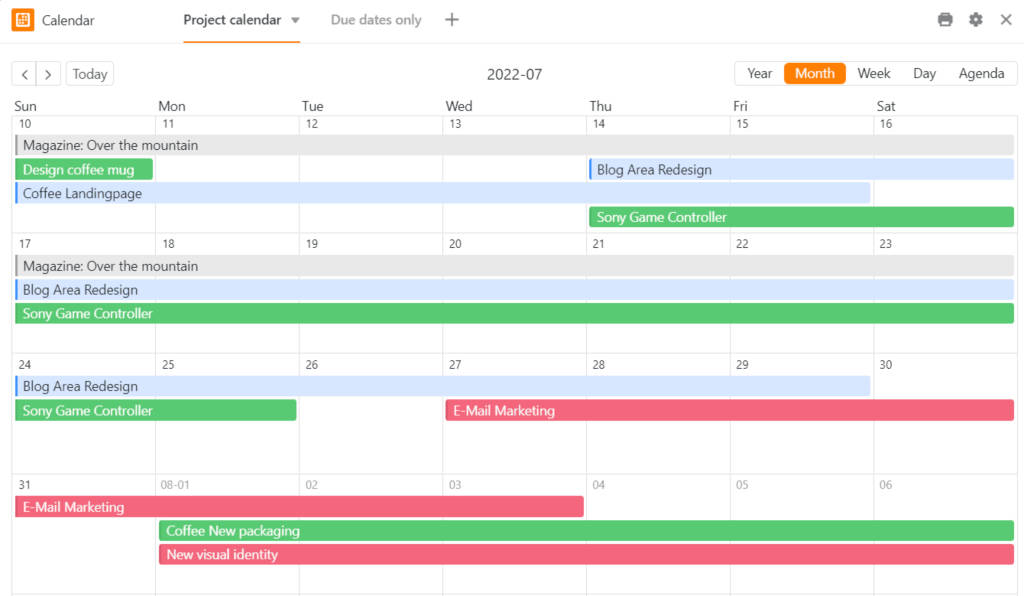
Best for: Teams needing on-premise Airtable-like databases
Standout Feature: Excel-style interface with advanced scripting and automation
SeaTable is another strong open-source Airtable clone that supports massive datasets, plugins, and integrations. It’s ideal for companies in regulated industries or with data residency needs.
Why it’s a strong Airtable alternative:
For large datasets, complex permissions, or compliance needs, SeaTable offers granular control and Excel-like familiarity. It can also be hosted locally or used via its cloud platform.
Pricing: Free cloud plan; Self-hosted enterprise plans available
Airtable Alternatives: Comparison Snapshot
Here’s a quick comparison snapshot:
| Tool | Best For | Strength |
|---|---|---|
| Notion | All-in-one doc + database teams | AI + flexibility |
| ClickUp | Task and workflow management | Modular PM + automation |
| Coda | Internal tools and templates | Scripting + packs |
| Asana | Simple project tracking | Timelines + goals |
| Smartsheet | Enterprise ops | Excel-like control |
| Monday.com | Visual project tracking | UI + integrations |
| Stackby | API-powered tracking | Affordability |
| Baserow | Developers/self-hosted teams | Open-source + custom logic |
| Zenkit | Multi-format teams | Multiple views |
| SeaTable | Regulated industries | On-prem + scripting |
What Redditors Think About Airtable
Reddit is often the first place tech-savvy users turn to when they’re dissatisfied or thrilled with a product. Here’s a glimpse into how Airtable is perceived by the Reddit community:
Pros Users Appreciate:
“Flexible database without writing a line of SQL.”
“The interface is friendly for both marketers and engineers.”
“Powerful for prototyping internal tools without dev time.”
Common Complaints:
Pricing: “Once your team grows or your bases grow, it gets expensive fast.”
Performance: “Large tables slow down significantly.”
Limitations in Permissions: “Can’t finely control who sees what in a base without workarounds.”
Frequent Use Cases Discussed:
Building lightweight CRMs
Managing editorial calendars
Organizing startup operations and MVPs
Inventory tracking for small businesses
Top Reddit Threads Reference:
r/nocode and r/saas frequently compare Airtable with Notion, Coda, and Baserow.
Some users recommend using Airtable + Make or Zapier instead of switching platforms.
Verdict from Redditors: Airtable is still loved for early-stage work and fast prototyping, but many power users outgrow it and move to tools with better automation, permissions, and scale.
How to Choose the Right Airtable Alternative
When evaluating which Airtable alternative suits you best, consider the following:
| Criteria | What to Ask |
|---|---|
| Primary Use Case | Are you building an internal tool, content calendar, CRM, or project tracker? |
| Data Complexity | Do you need relational databases, or simple lists and boards? |
| Collaboration Needs | How many team members need editing access or comment capabilities? |
| Integration Support | Do you need to pull/push data from other tools like Slack, Gmail, or CRMs? |
| Automation | Will you need to trigger workflows or updates based on changes? |
| Hosting Preference | Is cloud hosting enough, or do you need on-premise deployment? |
| Pricing | What’s your per-user/month budget, and are there hidden costs for integrations or views? |
Final Verdict
Airtable’s versatility makes it a solid all-rounder—but it’s not always the perfect fit. Whether you’re a document-heavy team, a structured enterprise, or a startup scaling your automation needs, there’s an alternative better suited to your workflows. If you’re feeling boxed in by Airtable’s limits—or just looking to cut costs or improve usability—it’s the right time to explore these tools and level up your workflows in 2025.
FAQs About Airtable Alternatives
Why would someone switch from Airtable?
While Airtable is versatile, users often outgrow its automation limits, permission controls, or run into pricing walls as data scales.
Which Airtable alternative is best for content teams?
Notion and ClickUp are great choices—Notion for its document database fusion and ClickUp for project tracking granularity.
Are there open-source Airtable alternatives?
Yes. Baserow and SeaTable are excellent open-source options for teams that need self-hosting and custom plugin development.
What if I need live data from APIs in my tables?
Stackby is ideal for that. It supports API connectors that can pull real-time data into table columns without coding.
Which alternative offers the best UI for non-technical users?
Monday.com and Coda are both intuitive and beginner-friendly while still offering backend power.
The post 10 Best Airtable Alternatives for 2025: Smarter Ways to Organize Work appeared first on SaaSworthy Blog | Top Software, Statistics, Insights, Reviews & Trends in SaaS.





